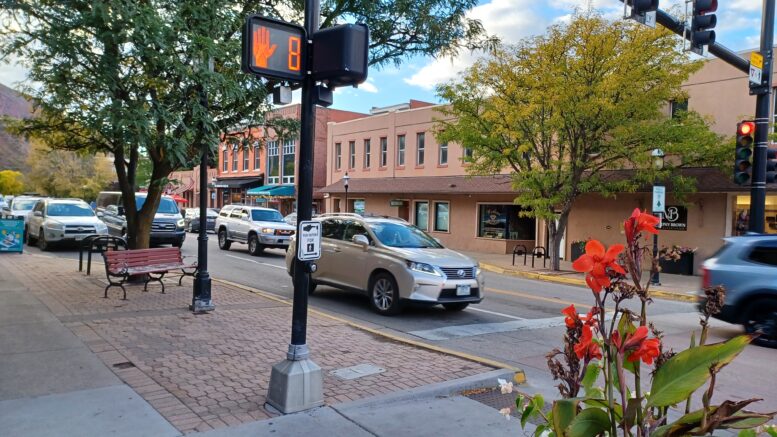The U.S. Environmental Protection Agency has rejected Gov. Jared Polis’ last-ditch request to waive the mandate for reformulated gas sales along the Northern Front Range this summer, though it said it could reconsider the plea if there is a fuel shortage.
An official from the federal agency confirmed the decision to The Sum & Substance this week. Polis’ office did not offer comments in response.
The nine-county area stretching along the Interstate 25 corridor from Douglas County nearly to the Wyoming border is in severe nonattainment of EPA ozone standards. While former Gov. John Hickenlooper had requested to extend the attainment date to reach the ozone National Ambient Air Quality Standard, Polis withdrew the request after taking office in 2019, saying that achieving compliance was necessary for public health.
As the EPA was preparing to move the area from serious to severe nonattainment status in 2022, however, the Democratic governor began asking about a waiver from one condition imposed by the status — mandatory summertime sales of reformulated gas. Reformulated gasoline is a fuel that is blended to burn more cleanly than conventional gas and reduce smog-forming and toxic pollutants, and it is required for use in severe nonattainment areas in 17 states and Washington D.C.
Polis’ recent ask
On April 4, Polis again requested a waiver, saying in an 11-page letter to EPA Administrator Michael Regan that he had contracted a study that found not only that the costs of the mandate would be excessive, but that use of the gas actually could increase pollution. A key tenet of his argument was that pipelines could not supply all the gas needed by the area, leading to shortages, price spikes between 60 cents and $1.47 per gallon and an increase in gas-burning trucks bringing the fuel to stations.
“Any supply shortages could significantly hamper Colorado’s economy and undermine adequate consumer supply,” Polis wrote. “With an average daily fuel demand of 114 MPBD (thousand barrels per day), this means Coloradans will be spending an additional $2.9 million … per day on fuel with nearly imperceptible reductions to ozone concentrations in a limited portion of the (Denver Metro/North Front Range) nonattainment area.”
An analysis from petroleum-industry analytics firm Energy Analysts International that Polis sent with the letter calculated the total impact could reach $431.2 million for gas costs and $61.8 million for diesel, based on the effect of gas shortages driving RFG prices higher. A prime reason gas supplies could fall 15% to 45% short of peak summer demand is because the only area refinery — the Suncor Energy plant in Commerce City — produces just 38% of gas used in the Denver market, requiring the rest of the RFG to come in via five major pipelines that historically are constrained during summer months, it found.
All of that failed to move federal officials, however.
EPA disputes concerns about reformulated gas supply
A statement from an EPA spokesperson said the agency reached out to the U.S. Department of Energy immediately upon receipt of Polis’ waiver request and contacted the primary fuel suppliers to the Denver area to evaluate the supply situation. That led it to determine there is no immediate risk of inadequate supply of reformulated gas to the nonattainment area.
“EPA’s conclusion, based on our assessment to date, is that the fuel suppliers to the DMNFR market have made the necessary preparations to deliver a volume of RFG in a cost-effective way, consistent with historic market demand,” said Taylor Gillespie, EPA Region 8 Public Affairs Director. Region 8 covers Colorado, Montana, North Dakota, South Dakota, Utah and Wyoming.
However, the EPA did acknowledge, per Polis’ letter, that if even one supplier to the market is unable to produce reformulated gas in planned volumes, it could lead to an inadequate supply for this area. Because of that, EPA and DOE decided to hold the emergency fuel waiver request open, allowing the agencies to “continue to monitor the fuel supply and act promptly if necessary,” Gillespie added.
There remains a significant gap around the expected price hikes that reformulated gas will cause. While the EAI analysis determined it would average 60 cents per gallon more than the equivalent price of conventional gas because of Colorado’s geographic isolation and lack of refineries as compared to other severe nonattainment areas, EPA maintains the cost should be just 3 cents per gallon higher.
Could reformulated gas lead to more pollution?
Another dispute between Polis and the federal agency centers on the effect of the mandate on emissions and air quality during the time it’s expected to be in place. EPA officials said in the statement that they expect the requirement will begin on June 1 and run through Sept. 15.
In addition to an increase in large trucks bringing reformulated gas to the area, Polis wrote that the state must consider incoming requests to expand fossil-fuel facilities such as terminals in already polluted communities within the nonattainment area. Also, the EAI analysis found reformulated gas will produce a two-tons-a-day decrease in volatile organic compound emissions, a half-ton daily reduction in nitrous oxide emissions and no decrease in greenhouse gas emissions, creating a maximum benefit of a 0.1 part-per-billion decrease in ozone concentrations.
EPA officials have maintained that the use of reformulated gas, in conjunction with other efforts such as reducing emissions from facilities and wells in nonattainment areas, has produced a wealth of health benefits in these areas, cleaning the air to reduce the incidence of respiratory and cardiac conditions such as asthma attacks and lung disease. It expects similar results in Colorado.
Dan Haley, president/CEO of the Colorado Oil & Gas Association, said Polis’ April 4 waiver request came too late in the process to achieve its goal. Other observers criticized the governor similarly.
